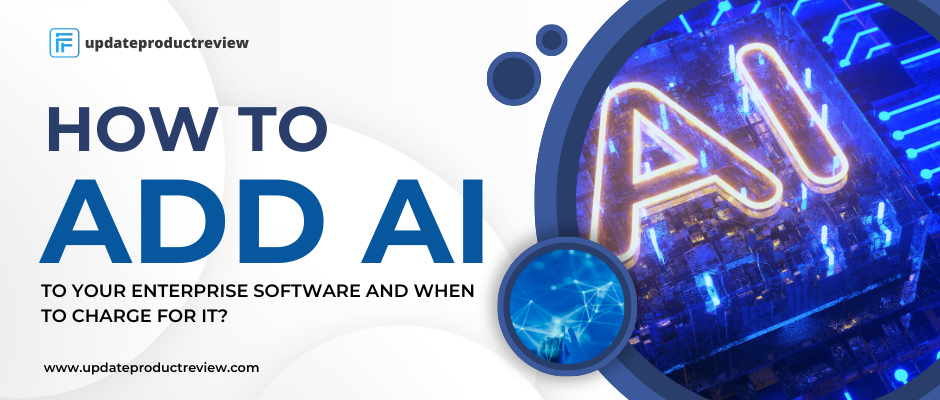AI and enterprise software have a lot in common.
In a world where technology changes quickly, putting artificial intelligence (AI) into workplace software is necessary for businesses that want to stay competitive. Here there is an important question arises: How to add AI to your enterprise software and when to charge for it?
Let’s move towards its answer.
How AI adds value to enterprise software
Before going into pricing strategies, knowing what value AI adds to business software is essential. AI-powered features can change how work is done by enabling predictive analytics, automating processes, and providing each user with a personalized experience.These skills lead to answer How to add AI to your enterprise software and when to charge for it?
It produces higher productivity, lower costs, and better decisions, directly affecting a company’s bottom line.
How to Price Software with Artificial Intelligence
Integration’s Difficulty
The amount of difficulty in putting AI into enterprise software is a critical factor in figuring out how much it will cost.

A flat fee might be fair if the integration goes smoothly and doesn’t require many changes to the current infrastructure. But if the integration involves a lot of customization and training, you can justify a tiered pricing model or extra fees for professional services.
Customization and Being Able to Grow
Enterprises have different wants and requirements, so pricing needs to be flexible. Businesses can choose AI features that help them reach their specific goals when there are choices for customization. Also, scalable pricing models let companies start small with AI and use it more as they see tangible benefits.
ROI and Value Added
Pricing should be based on how much value AI adds. Enterprises are more likely to invest if they can quickly see how AI features improve operations, streamline processes, and yield a positive return on investment (ROI). Offering trial times or pilot projects to show AI’s capabilities can help businesses see the benefits for themselves.
Industry standards and the landscape of competitors
It is essential to monitor industry standards and rivals’ pricing strategies. Charging more than the going rate can turn off potential clients, while charging too little could make AI integration seem less valuable. To stay competitive, you need to find the right mix.
Plans for charging for the integration of AI
Freemium Model: Luring People in with the Basics
One way to do this is to use a freemium strategy, in which basic AI features are given away for free to entice customers to try them out and see how they work. Then, businesses that want to use AI to its fullest potential can pay more for special features or advanced functions.
Pricing based on use: “Grow as you go”
Usage-based pricing is becoming more common because it lets businesses pay for AI services based on how much they use them. This method aligns with scalability, so small and large companies can use AI integration.

Different prices based on what you need
Tiered prices can serve different kinds of customers based on how much AI is used. Organizations of all sizes can use AI because they can choose the tier that best fits their goals and budget.
Value-based pricing: putting a price on what you do
It is wise to charge based on the value that AI features bring. For this method to work, you need to carefully evaluate the client’s potential return on investment (ROI) and ensure that the price matches the effect on their operations.
Figuring out when to start using AI
How Old Your Software Is
Check how mature your software is before adding AI. AI features work better and are easy to add to software already been used for a while.
Market trends and what customers want
Keep track of what customers want and what the market is doing. If your clients wish to feature AI powers, adding AI to your software might be time.
Advantages over competitors
If your competitors use AI to develop new ideas, adding AI to your software can help you keep or gain a competitive edge.
Resources that are ready and available
Check to see how ready your team is to use AI. If you have the money and knowledge you need, it’s a good sign that you’re prepared to jump in.
How to Navigate the Path to AI Integration
AI integration into business software is a dynamic process that requires careful thought about pricing strategies and timing. Balancing how AI is seen and priced to meet customer needs is essential, and complex is critical and challenging. As AI continues to change how businesses work, it will be necessary to be flexible and focus on the customer to succeed in this new age.
Click Here to Read More Technology Articles.









